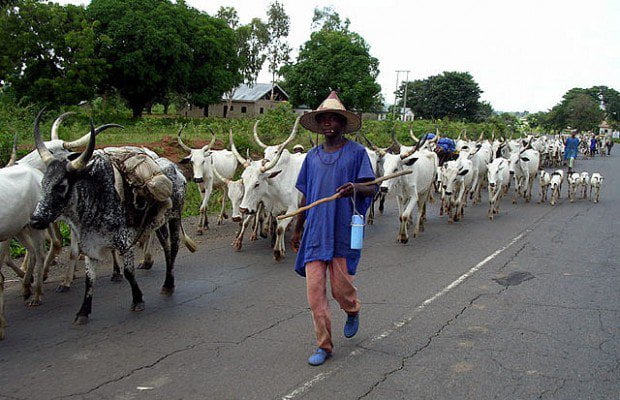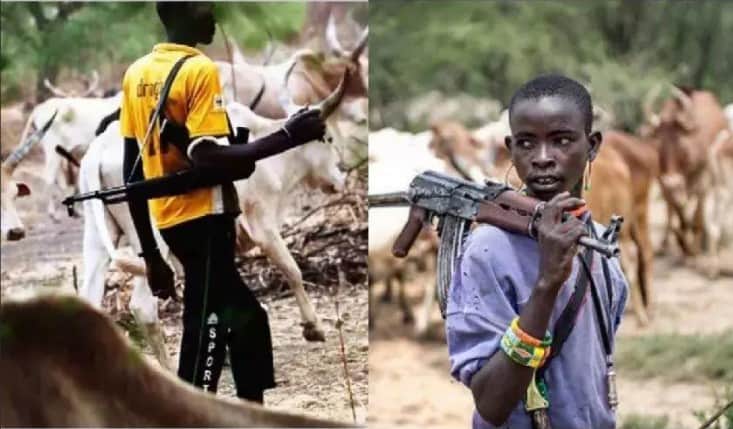Nigeria News
FG To Find Lasting Solution To Herdsmen/Farmers Clash In North


The Federal Government have today announced its intention to provide a lasting solution to the ongoing clashes between herdsmen and farmers in the country.
This is after the Nigerians living in the Netherlands advised the president to proffer a lasting solution and end the incessant killings of innocent Nigerians by the herdsmen in the Northern part of the country.
Speaking in an interactive session with Nigerian post graduate students studying in Wageningen University and Research Centre (WUR), Netherlands, widely regarded as one of the world’s top agricultural research institutions, the Minister of Agriculture and Rural Development Minister, Audu Ogbeh, assured the students that government was on top of the security situation.
The Minister was responding to concerns raised by the students about the security situation in some North Central States in the country, particularly the clashes between pastoralists and farmers.
Ogbeh, the Minister of State, Industry, Trade and Investment, Aisha Abubakar, the National Security Adviser (NSA), Major-General Babagana Monguno (Rtd), Governor Simon Lalong of Plateau State and Governor Oluwarotimi Akeredeolu of Ondo State who are part of President Buhari’s official delegation to the Netherlands, had visited the Research Centre for greenhouses in Bleiswijk, operated by WUR.
After a guided tour of the Centre, Ogbeh told the students that Nigeria was looking forward to their innovation, learning, expertise and knowledge to address some of the current challenges in the agriculture and food security sectors.
According to him, ‘‘We congratulate you on coming here to pursue your studies, and we expect that when you get back, you’ll find a different situation in the country because we will need some of you to manage the ranches.
‘‘When you do return, it’s people like you whom we hope we can organise to manage the ranches. There will be water, there will be fodder, and there will be electricity and some accommodation for the herdsmen.
‘‘Believe me, after six months, when the herdsmen realise that this new life is better than roaming through the bush, you will have to force him to leave that place.
‘‘It’s going to be slow, it’s going to be a bit expensive but we must end the crisis. We have to stop it because the crisis is unnecessary. The killings are undesirable.”
The Minister also explained the Federal Government’s decision to encourage ranching in the States, following recommendations by the National Economic Council in March this year.
He said, ‘‘We want to have large ranches because we discovered in our research that we have 450 grazing reserves created from 1952 to 1966.
‘‘The entire land mass is 5 million hectares some of which has been encroached upon leaving some 4 million hectares. This is more than enough to keep 80 million cows, assuming if we have 17 cows per hectare.
‘‘So we have the land and we are committed to developing it by providing water and protecting livestock from rustlers.”
On his takeaway from the tour of the Centre, Ogbeh said Nigeria had a lot to learn, and replicate at home, on agricultural innovation from the Netherlands, which is the second largest exporter of food, second only to the United States.
Speaking to the students, the NSA encouraged them to consider the ‘‘security angle’’ in their agricultural research to improve the situation at home, in terms of diminishing water, shrinking of spaces, insecurity and others.
‘‘We have spent years from 1964 till now, doing feasibility studies on how to get water back into Lake Chad. Something is wrong if we keep going on and on in perpetuity without getting any result.
‘‘If we are able to solve the problem of lack of water in the Lake Chad, it will discourage people from migrating in large numbers to other places.
‘‘I think we also have to ask young people like you, young men and women, new generation to begin to interface with people in this environment, your colleagues from the Netherlands on how we can deal with this problem,’’ Monguno said.
Meanwhile, Nigerians in the Netherlands have told the President to live up to his responsibility and stop the killings in the North Central geo-political zone of the country.
Chairman of Nigerians in Diaspora Organisation, NIDO, Julius Nnamdi Nwankpa, urged the government and security team to accelerate stoppage of unfortunate killings, while also calling on Nigerians “to play their roles in breaking the cycle of violence, which usually has no winner.”
Nnamdi commended President Buhari for the war against corruption, “for which you have earned respect around the world,” high improvement in infrastructural development, and for signing into law the Diaspora Commission Bill, which he hoped would “become effective as soon as possible.”
The President had while addressing members of Nigerians in Diaspora, on the sidelines of his official visit to The Hague, Netherlands said, “I am pleased with the quality of people I am seeing. You are high quality people. Congratulations on your personal achievements.”
He said that he was quite pleased with their intellectual and professional achievements, and lauded them for representing Nigeria well, and for always being in touch with their motherland.
Among those who met President Buhari were Nwankpa, Chairman NIDO, Dr Mustapha Gidado, a specialist in tuberculosis, having oversight over management of the disease in 22 countries, Lola Visser Mabogunje, a performance monitoring expert, Dr Peter Ngene, a research scientist and Assistant Professor at Utrecht University, Engineer Cornelius Obot, a software expert, and Toyin Loyo, an artist and culture enthusiast of international repute.
Speaking on behalf of the
The delegation presented the gift of an artwork called Light to President Buhari, with Toyin Loyo, the creator of the work saying: “The work is illuminating. You bring light, which will never go out, and which will shine round the clock.”
